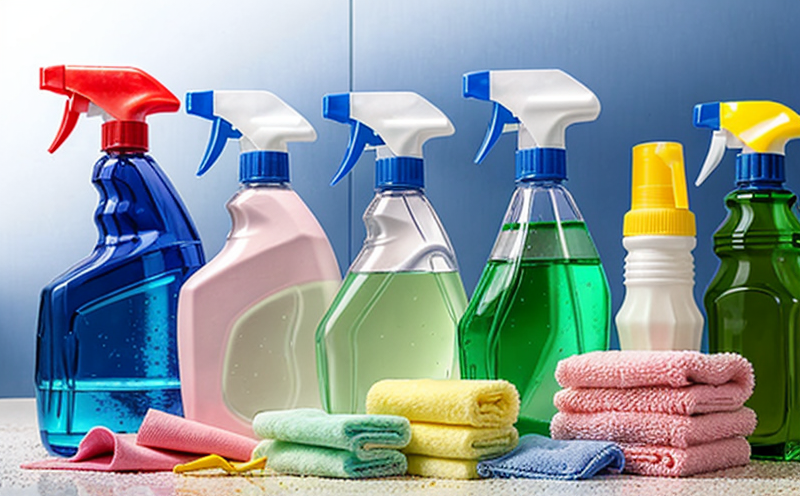Inhalation Toxicity Testing in Aerosol Cleaners
Consumer products and cleaning agents represent a vast array of applications that can significantly impact human health. Among these are aerosol cleaners, which are widely used for personal hygiene and home maintenance. Inhalation toxicity testing is an essential step in ensuring the safety of such products before they reach consumers. This service ensures that aerosol cleaners do not pose any significant respiratory risks to users.
At Eurolab, our inhalation toxicity testing focuses on determining the potential adverse effects of a product's volatile components when inhaled by humans or animals. The primary objective is to identify any harmful substances capable of causing irritation, inflammation, or other detrimental health impacts upon exposure. This testing helps manufacturers comply with regulatory standards and ensures consumer safety.
The testing process involves exposing laboratory animals (typically rats) to the aerosol cleaner under controlled conditions over a specified period. During this time, the animals are observed for signs of respiratory distress, changes in behavior, or other indicators of adverse health effects. The test is designed to mimic real-world usage scenarios as closely as possible.
The inhalation toxicity testing procedure typically follows these steps:
- Specimen preparation: Aerosol cleaners undergo rigorous sampling procedures to ensure accurate representation of the product's composition.
- Animal selection and housing: Laboratory animals are selected based on species sensitivity, with rats being a common choice due to their respiratory tract anatomy.
- Exposure chamber setup: The exposure chamber is calibrated to deliver consistent concentrations of the aerosol cleaner vapor to ensure accurate testing conditions.
- Inhalation protocol: Animals are exposed to the aerosol for designated durations and intervals under strict monitoring.
- Data collection and analysis: Continuous observation and recording of any adverse effects provide insights into the product's potential toxicity levels.
The results of this testing serve as critical inputs for risk assessment, helping manufacturers make informed decisions about necessary safety measures. Compliance with international standards such as ISO 14039 or ASTM E2185 ensures that our testing aligns with global best practices and regulatory requirements.
Inhalation toxicity testing in aerosol cleaners is not just a compliance exercise; it's a vital step towards safeguarding public health. By adhering to this rigorous process, Eurolab contributes significantly to the development of safe and effective cleaning products that consumers can trust.
Eurolab Advantages
At Eurolab, we pride ourselves on offering comprehensive testing services tailored specifically for consumer products and product safety. Our inhalation toxicity testing in aerosol cleaners stands out due to several key advantages:
- Expertise and Experience: Our team comprises highly skilled scientists with extensive experience in conducting inhalation studies, ensuring accurate and reliable results.
- State-of-the-Art Facilities: We operate cutting-edge laboratories equipped with advanced instrumentation to conduct precise and consistent testing.
- Comprehensive Reporting: Eurolab provides detailed reports that not only summarize test outcomes but also offer valuable insights for product improvement.
- Regulatory Compliance: Our services are aligned with international standards, ensuring compliance with local and global regulatory bodies.
- Client-Centric Approach: We work closely with clients to understand their specific needs and tailor our services accordingly.
- Quick Turnaround Times: By optimizing processes, we ensure that clients receive timely results without compromising on quality.
These advantages make Eurolab a trusted partner for manufacturers looking to enhance the safety profile of their aerosol cleaner products.
Quality and Reliability Assurance
At Eurolab, we are committed to delivering high-quality, reliable testing services that meet or exceed international standards. Our inhalation toxicity testing in aerosol cleaners is conducted with unwavering dedication to accuracy and precision.
We follow a stringent quality assurance process, starting from the initial consultation phase where we work closely with clients to understand their specific requirements. This collaborative approach ensures that our test protocols align perfectly with client expectations. Upon completion of each inhalation toxicity study, comprehensive reports are generated, detailing all aspects of the testing process and results.
To further enhance reliability, Eurolab adheres to strict quality control measures throughout every stage of the testing cycle. Regular calibration checks and performance evaluations ensure that our equipment remains accurate and consistent. Our team also undergoes continuous training to stay updated with the latest methodologies and technologies in inhalation toxicity testing.
The commitment to quality is not just limited to technical aspects but extends to ensuring ethical practices as well. We adhere strictly to guidelines set forth by relevant regulatory bodies, thereby maintaining a high level of trust among our clients.
Use Cases and Application Examples
Inhalation toxicity testing in aerosol cleaners is crucial for various applications within the consumer products sector. Here are some real-world use cases highlighting its significance:
- New Product Development: When launching a new aerosol cleaner, inhalation toxicity tests help identify potential hazards early on, allowing manufacturers to make necessary adjustments before market release.
- Compliance Audits: Regular testing ensures continuous compliance with changing regulations and industry standards, providing peace of mind for regulatory authorities and consumers alike.
- Risk Management: By identifying toxic components early in the development cycle, manufacturers can manage risks effectively, reducing potential legal liabilities and negative publicity.
- Labeling Accuracy: Accurate inhalation toxicity data contributes to more precise labeling of products, helping consumers make informed choices about their purchases.
- Research and Development: Inhalation toxicity testing supports ongoing R&D efforts by providing valuable feedback on product formulations and potential improvements.
- Supplier Verification: For companies sourcing aerosol cleaners from multiple suppliers, inhalation toxicity tests ensure consistent quality across different batches.
These use cases underscore the importance of robust inhalation toxicity testing in ensuring consumer safety and maintaining brand reputation. Eurolab's expertise ensures that these services are delivered with precision and reliability.





